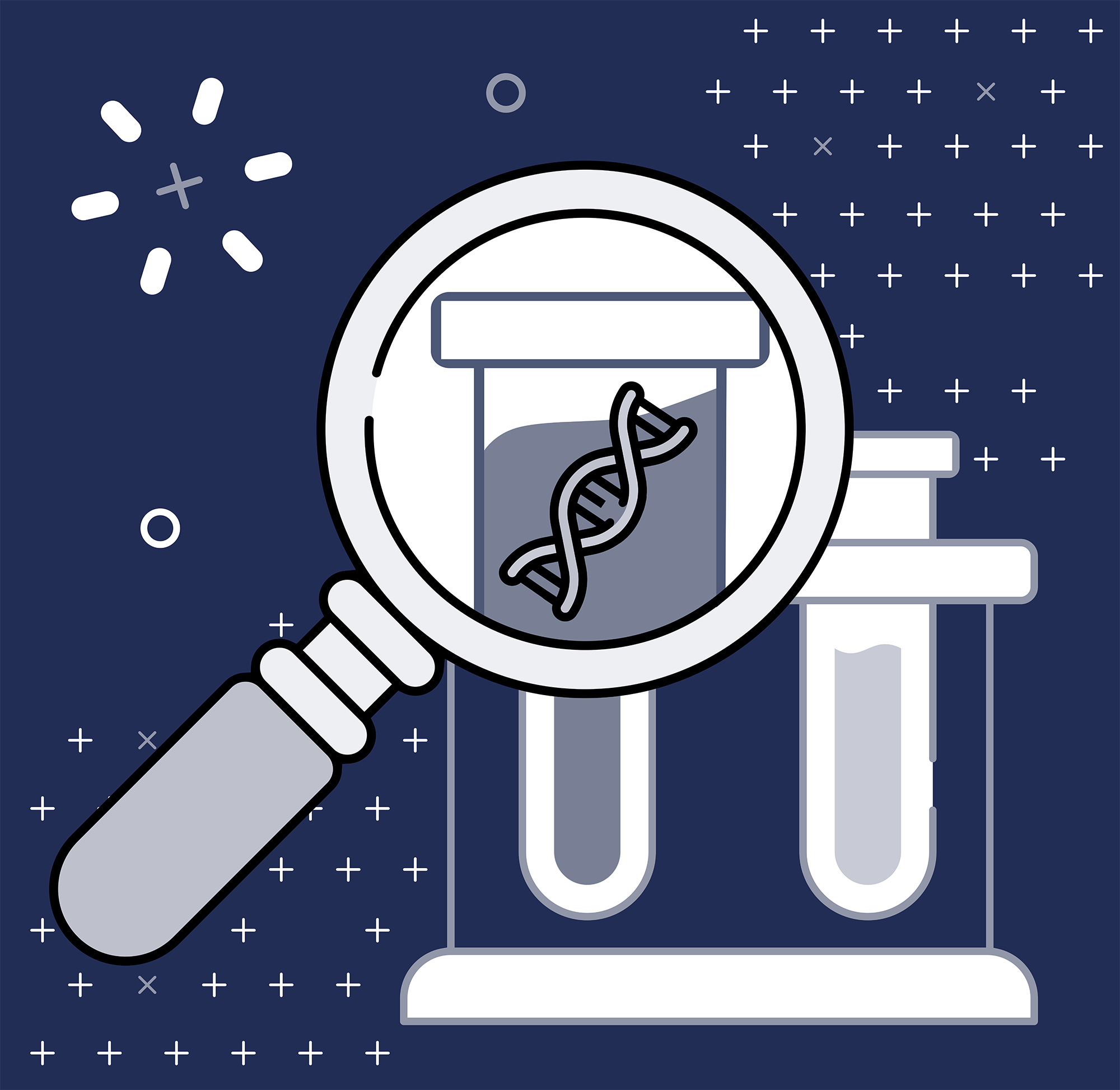Genetic testing has improved a lot over the last ten years and it is now possible to test for many of the genes causing inherited sight loss. In early 2022, the NHS introduced whole genome sequencing (WGS) for all inherited retinal dystrophy genetic testing. WGS is more in-depth than the old style test and examines sections of genetic code that were previously ignored. However, genetic testing cannot find the genetic diagnosis in everyone. There are genes that haven’t been discovered yet. Also, scientists don’t yet understand all the changes and differences in the genetic code.
Genetic testing involves reading along the DNA code to find a change that is predicted to cause a genetic condition. Scientists in a genetics lab are experts at understanding the changes in genes. They can be confident that a specific change at a specific location of a gene causes a condition when it has been seen in many other people with the same condition. Sometimes however, it may be less easy to be sure whether a change is causing the condition or whether it is a normal part of the variation we all have in our genes. Your doctor or genetic counsellor will be able to explain the results and the next steps if the result is uncertain. See Genetic counselling.
Why get a genetic test?
A genetic diagnosis can provide very helpful information. It can help your ophthalmologist understand exactly what is causing your sight loss, which may make it easier for them to explain how it might develop and confirm the inheritance pattern. In addition, some retinal conditions are just the first symptom of a condition affecting other parts of the body, such as the kidneys; a diagnosis of one of these conditions may be revealed by the genetic test result, which means doctors can keep an eye on and take care of other potential problems.
A genetic diagnosis might also open up choices about genetic testing for other members of the family and mean you or your close relatives can think about family planning choices. There is more information about the options available, including details of support organisations, on our Family Planning page. It can also be useful to discuss your options with a genetic counsellor.
As more treatments become available, a genetic diagnosis will also clarify which ones may work best in your particular case. At the moment, gene therapies and other cutting edge treatments may only work for a specific genetic fault; if you are already aware of your genetic diagnosis as these treatments start to become available for patients, you will know straight away if they might work for you. You might also be in a position to take part in clinical trials and other research studies that are recruiting participants with a particular faulty gene.
Limitations of genetic testing
Genetic testing may cause anxiety: you may find out there is currently no treatment being developed that might work for you, or you might not get a clear result. The result may also have implications for other family members; it would be up to you to talk about these with relatives and this could be difficult. This is why it is always a good idea to see a genetic counsellor alongside testing if possible. They can talk to you about these issues and help you decide how to deal with them. See Genetic counselling.
What if my test result doesn’t provide a genetic diagnosis?
For around one third of people with inherited sight loss, diagnostic genetic testing won’t give a result. This is because their condition is caused by a mutation that has not yet been confirmed as one that is connected to retinal conditions. These people will not be able to benefit from the choices that come with a genetic diagnosis but may be able to take part in research studies that aim to find new genes and mutations.
As medical understanding and technologies improve, it may be that this group of people will get a genetic diagnosis or more certain test result in future. At the point of initial testing, you may be asked for consent to repeat the test on your blood sample should the scope of the test expand. Ask your ophthalmologist or genetic counsellor for more details.
So that more people with inherited retinal conditions can receive a diagnosis, Retina UK is funding work by the UK Inherited Retinal Dystrophy Consortium to hunt for unidentified genes, find out how mutations change their function and ultimately understand how they contribute to sight loss.
How do I access genetic testing and counselling?
If you have a diagnosis of an inherited retinal condition, or you are a relative of somebody living with one of these conditions, you are entitled to access testing and genetic counselling.
If you are living with inherited sight loss, your ophthalmologist may be able to make arrangements for the test, or they can refer you to a specialist ophthalmic genetics centre. You should always be given the opportunity to access genetic counselling alongside or after the test; this can be provided by the ophthalmic genetics centre or via referral to your regional genetics service.
If you are not currently under the care of an ophthalmologist, ask your GP for a referral to your local ophthalmology department or to a specialist ophthalmic genetics centre.
You can find details of ophthalmic genetics clinics in Ophthalmic genetics clinics.
If you are the family member of a person with inherited sight loss and would like to consider genetic testing, ask your GP for a referral to your regional clinical genetics service for genetic counselling.
We have produced some information for healthcare professionals to help you discuss testing with your GP or ophthalmologist. See For professionals.

